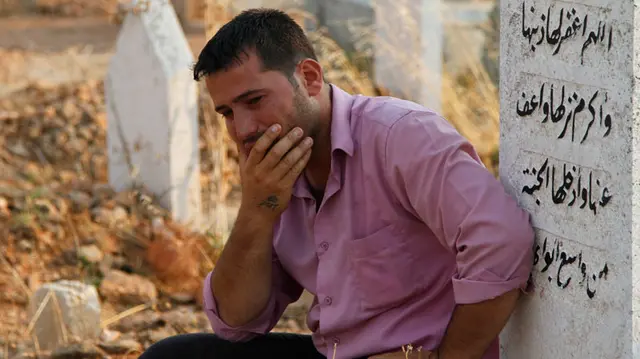The 43-year-old Slaiman said his current life in an under-construction house with nothing but a shabby rug feels like heaven to him in comparison with his previous life under the rule of the Islamic State (IS) group.
Slaiman, a father of four, had lived in the IS de facto capital of al-Raqqa in northern Syria, before he couldn't take it anymore and finally fled to the capital Damascus' suburbs.
His current life is extremely miserable as he lives in an unfinished home with nothing but a rug and plastic bags plastered on the walls of his new dwelling, covering the window holes because he actually has no glass to make an actual window.
"The awful practices of IS has pushed me to consider leaving my town and come here to Damascus," Slaiman told Xinhua, while he was sitting in a yard near the unfinished building where he and other displaced Syrian families are staying at in Damascus' eastern district of Jaramanah.
Slaiman said he was a taxi driver in al-Raqqa, adding that when IS stormed his village of Jraineh in the countryside of the city, thoughts of leaving the town started taking hold in his mind, especially after he saw the practices of IS.
"I was driving my taxi cab in one of al-Raqqa's streets and suddenly the IS police stopped me. They told me I need to get out of the vehicle and go with them to the prison because the passengers who were with me were women whose eyes were not covered, " he said.
"I was asked to pay a fine worth 150 U.S. dollars. I didn't have the money on me in that doomed day, so I had made some calls and my friends bailed me out," he said, noting that "It was the straw that broke the camel's back... after I was released I knew I shouldn't stay in that madness anymore."
Slaiman said he had sold his taxi cab and started making arrangements for his departure along with his family.
"It was not easy for me to get out of al-Raqqa. I had to send my wife and kids first, because women and children can leave easier than men. When I knew they crossed out of al-Raqqa, I talked with a fellow taxi driver who hooked me up with a smuggler that knows his ways around," Slaiman said.
He met his family in a rendezvous point near the eastern city of Deir al-Zour, where they headed to central Homs province through the desert and finally arriving in Damascus.
"My trip to Damascus has cost me around 300 dollars, but I didn' t care. All I cared about was me and my family out of al-Raqqa," he recounted.
"Now I am sitting here in Jaramanah in a house that is not actually a house yet. The cold is biting through our bones and I still have no job here, but I am happy because everything is manageable, except living under IS," he said, noting that he and his family live on charities.
"Despite our agony and suffering, it's hundred times better than staying there," he said, sipping hot tea with his sons playing in a yard where empty bullet shells and exploded mortar shells scattered on the ground.
Jaramanah itself was a target for the rebels in nearby suburbs before the army took control of its surrounding, which decreased the number of mortars targeting it.
In the same building, there is another family which had also fled the so-called IS capital.
Ali, a father of seven, was diagnosed with kidney failure and spine disk. However, all of his illness didn't spare him the wrath and punishment of IS, whose militants have put his name on their wanted list because he has three sons that serve in the Syrian army.
Siting helplessly on his thin rug in Jaramanah, Ali said "I had fled al-Raqqa because of the IS practices. They wanted to take revenge of me because I have got sons who serve in the army."
"The IS practices pushed me out of my home, pushed me to take a risky road to arrive here. They are like the plague, which don't distinguish between the sick and the healthy, the poor or the rich. They are like a wildfire that needs something to feed on," he said of the IS militants.
Aside from the difficulty to put food on the table, Ali also suffers a lot of pain as he cannot afford medication for his chronic illness, or even his children.
Pointing his finger at a little girl sleeping in the corner of the room, Ali said "my daughter Jihadn couldn't go to school today because she is sick, but unfortunately we neither have the money to take her to a good doctor, nor to buy the meds."
The families of Slaiman and Ali are two of thousands of families who were deprived of proper life due to the prolonged Syrian crisis, which is deemed by activists as the worst humanitarian crisis since the World War II.
Earlier this month, the International Committee of the Red Cross has warned of a deteriorating humanitarian situation in Syria as winter approaches.
Nearly five years of conflict have left much of the country's infrastructure destroyed or severely damaged. Hundreds of thousands of people are trying to survive with the most basic resources as temperatures fall below freezing.
"We need better access so that aid can be brought to the most vulnerable. The situation is nothing short of critical for many, many people," said a Red Cross statement sent to Xinhua.
More than 12 million Syrians, including 5.5 million children, are in need of immediate humanitarian assistance. More than four million people have fled abroad and around eight million are displaced within the country; many have been forced to move several times.
 简体中文
简体中文







